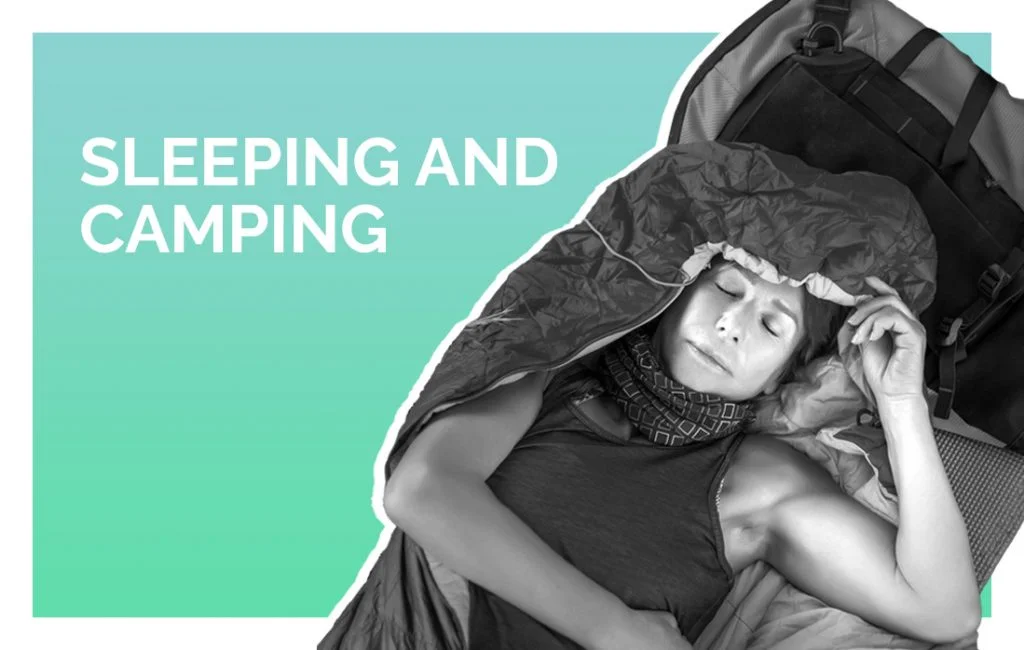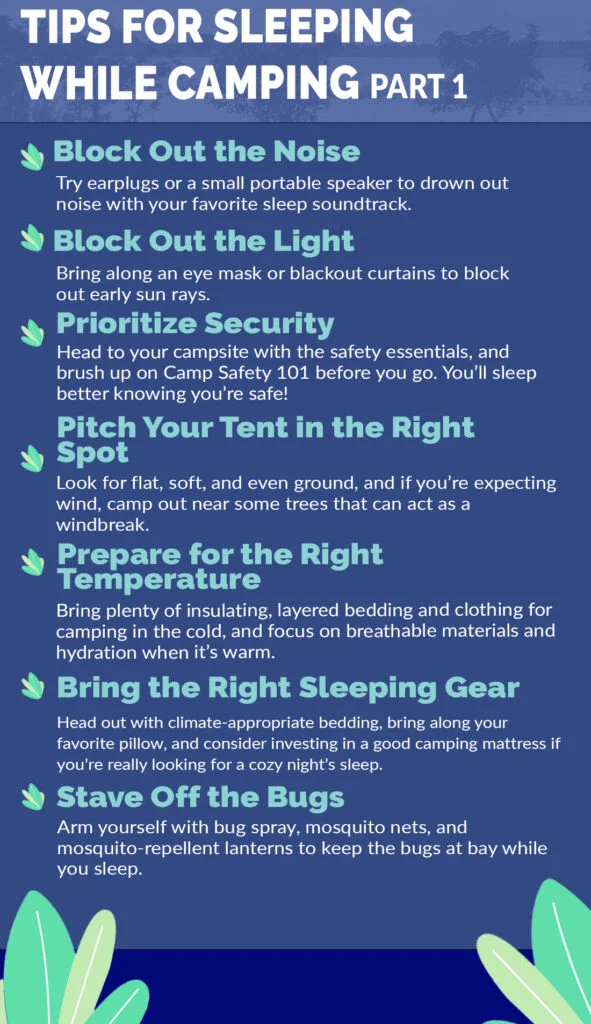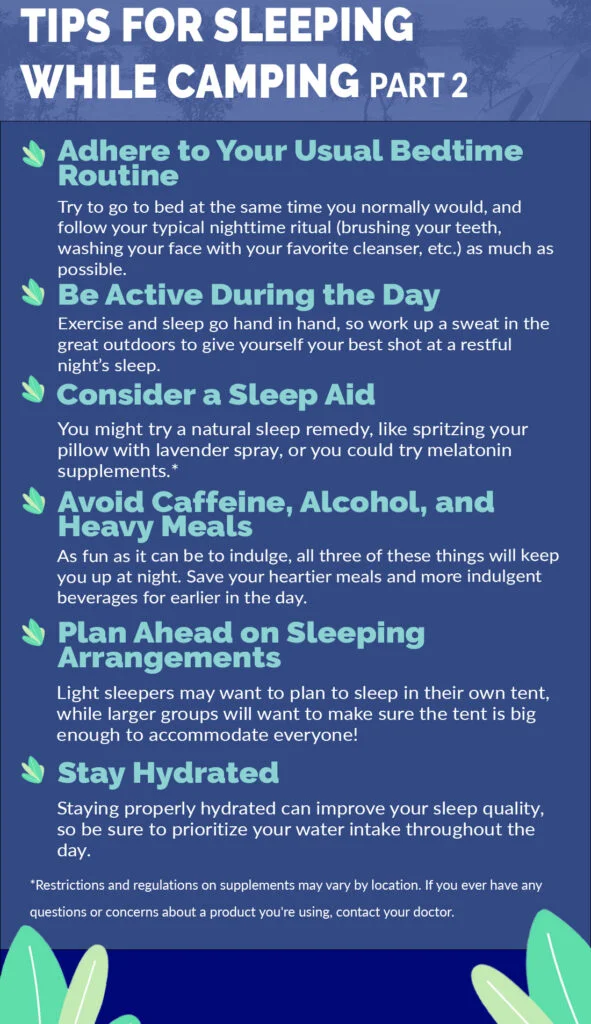
Falling asleep under the starry night sky can be relaxing, romantic, and rejuvenating. But unless you’re going glamping, spending a night sleeping on the ground in the great outdoors could mean getting a less than great night’s rest.
Disrupting our normal sleep patterns to spend the night in an unfamiliar environment could lead to some tossing and turning through the night. So the next time you’re packing your overnight bag to head out on a camping adventure, bring along some of our favorite tips and tricks to help you sleep a little easier.
Why is it so hard to sleep when camping?
The simple answer to this question is that we’re in the elements. We’re removed from our regular sleep environment and placed outdoors in variable temperatures with strange sounds to which we’re unaccustomed. We’re in an environment we can’t control, which makes it more difficult to control how well we sleep.
Not to worry though. We believe getting a restful night’s sleep will make you a happy camper. Here are some tips to help you do just that.
15 Tips for Sleeping While Camping
1. Block out the noise
Prowling animals and howling winds are just a couple of the sounds you may find yourself wanting to block out. So when you’re packing your camping supplies, be sure to bring some ear plugs along for a sounder night’s sleep.
Not a fan of wearing ear plugs in bed? Then try keeping the campfire tunes going after hours by bringing along a portable Bluetooth speaker. Play some soothing sounds, relaxing music, or white noise to lull you to sleep.
Need some inspiration? You’re in luck. A recent study found the most sleep-inducing tunes across several music genres. So whether you like pop, rock, or hip-hop, there’s some beats to help you get a good night’s sleep.
2. Block out the light
If you’re out camping, you may want to wake up early enough to catch the morning sunrise. But if not, you’re likely going to find yourself waking up to it anyway because of the effects of the natural light shining into your tent.
To prevent the sun’s rays from waking you up earlier than you would like, bring along an eye mask to block out the morning sun. If you’re not a fan of wearing an eye mask, try blackout curtains or drapes instead. Just hang them up in your camper before going to bed to keep the light from seeping in. If you’re camping in a tent, you may find this more difficult to achieve.
3. Pitch your tent in the right spot
Try to select a prime spot to pitch your tent. For instance, look to set it up on soft, flat, even ground. If possible, try to look for a place close to the restrooms.
Expecting a windy night? Try pitching your tent close to some trees that could serve as a windbreak. Instead of plopping down just anywhere, look for a location that lends itself to a better night’s sleep.
4. Prioritize security
Anything can happen when you’re in the wilderness, so it’s important to be prepared. Do your research beforehand so that you can take proper precautions based on the local wildlife in the area. Keep essentials, such as a flashlight or bear horn, nearby so you can keep an eye on your surroundings in case any unwanted visitors come near.
Likewise, make sure your shoes are close by in case you need to get up and go anywhere during the night. Taking the proper precautions will most likely give you peace of mind and help you rest easier.
5. Stave off bugs
Speaking of unwanted visitors, mosquitoes and other insects are often unwelcome guests when we’re spending the night outdoors. Hearing an annoying pest buzzing around at night can certainly rouse us from our sleep. Plan ahead and bring bug spray or set up mosquito-repellent lanterns around your tent to keep them at bay.
6. Prepare for the right temperature
Before you embark on your camping adventure, check the weather conditions for your camping area. Even if you’re camping in the summer, temperatures can dip quite a bit at night. So make sure you’re prepared for the cooler weather by bringing along extra blankets and layers of clothing in case you get chilly.
Likewise, if you’re expecting it to be hot during the evening, plan accordingly. Consider pitching your tent in a direction that will allow you to take advantage of any cool, evening breeze.
7. Bring the right sleeping gear
Another way to prepare for the right temperatures is by bringing along the right sleeping gear. If you’re expecting colder temperatures, pack a sleeping bag or other gear that’s designed to withstand the colder temps. On the other hand, if you’re anticipating a hot summer night, bring along a lightweight sleeping bag designed for warmer weather.
In addition to making sure your sleeping gear is appropriate for the weather and season, make sure it’s comfortable. Test it out before your camping adventure so you have time to swap it out if necessary, and prioritize comfort when expanding your collection of camping gear—a good camping mattress can make all the difference! And don’t forget to bring along your favorite pillow, blanket, and other little comforts of home.
8. Dress for the occasion
Be sure to dress appropriately for the weather, both day and night. If it’s cold out, bring along your comfy flannel pjs and an insulated jacket to keep you warm. Dress in layers so you can remove or add them depending on how you feel.
Trying to beat the sweltering heat? Wear lightweight, breathable clothing to help you stay cool through the night or a battery operated fan.
9. Be active during the day
Camping comes with plenty of opportunity for fun recreational activities like hiking, kayaking, and fishing, just to name a few. Whether it’s building a campfire, pitching a tent, or trekking into the woods, try to be active during the day. The more active you are during daytime hours, the more likely you will have a restful night’s sleep.
10. Use the restroom before bed
Just as you normally would, try to use the restroom before you turn in for the night. Relieving yourself before you go to bed should decrease the odds of you waking up in the middle of the night with the urge to do so, and will keep you from having to fully wake yourself up for trek to the bathroom.
11. Adhere to your bedtime routine
In general, it’s a good idea to adhere to your regular bedtime routine even when you’re away from home. For instance, try to go to bed at the same time you normally would. Brush your teeth before bedtime and bring along face wash and other products that you would normally have on hand.
Any interruptions in our regular nighttime pattern could cause a disruption to our sleep. Avoid that by going through as many of the steps of your regular bedtime routine as possible.
12. Avoid alcohol, caffeine, and heavy meals
It can be tempting to have a beer and a hearty meal around the campfire, but try to do so in moderation and well before bedtime hours. That doesn’t mean you can’t indulge in a good old-fashioned s’more, of course, but try to keep them to a minimum and plan for it earlier in the evening.
Research suggests that while alcohol can initially act as a sedative, that effect wears off after a few hours, causing us to have trouble sleeping. According to the Centers for Disease Control and Prevention (CDC), it’s best to avoid alcohol several hours before bedtime and to nix the caffeine at least five hours before turning in for the night. They also recommend avoiding heavy meals three hours before bedtime.
13. Stay hydrated
It’s important to take care of our bodies when we’re outdoors, and that includes staying well-hydrated. A Harvard study found that staying well-hydrated not only improves your physical health and mood, it also enhances your sleep quality. Generally speaking, women should drink around 11.5 cups a day and men should have 15.5 cups. Just remember to cut back on your water intake in the hours before you go to bed.
14. Consider using a sleep aid
If you struggle to fall asleep in unfamiliar environments or just in general, you may want to consider bringing a sleeping aid along with you.
Melatonin* is a hormone our bodies produce that helps signal when it’s time to go to bed. Some people take melatonin as a supplement to help them relax and fall asleep easier. In fact, research shows that more adults are using melatonin as a sleep aid now than in years past. Just be mindful of the amounts you’re taking—melatonin is not strictly regulated by the FDA in the United States, so amounts may vary from what you see on the label.
If you prefer not to use melatonin, there are other sleep aids you can try. For instance, there are calming aromatic mists and wellness sprays you can spritz on your pillow before you go to bed to soothe yourself into a peaceful night’s rest.
15. Plan sleeping arrangements
If you’re a light sleeper, you may want to think about pitching your own tent and setting up camp alone. If you are planning on sharing a tent with others, try to spread out so there are less disruptions if someone needs to get up during the night. Intentionally mapping out sleeping arrangements ahead of time and taking into account the sleeping habits of others should help you come up with the best-laid plans.
Camping somewhere without wifi? Take our tips with you by downloading the graphics below:


The Last Word From Sleepopolis
People tend to think of camping as “roughing it.” But it doesn’t have to be that way. You can have a comfortable camping adventure by following these simple tips and tricks for a restful night’s sleep.
*Restrictions and regulations on supplements may vary by location. If you ever have any questions or concerns about a product you’re using, contact your doctor.

























